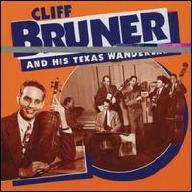Born in Houston, TX, in 1915, Bruner was performing professionally and wandering around Texas in search of gigs by the late 1920s. The medicine show provided him with early employment, as it did for many other early country stars; he had signed on with Dr. Scott's Medicine Show, a traveling caravan hawking a cure-all called Liquidine Tonic. In 1934, Bruner joined the pathbreaking Western swing band Milton Brown His Musical Brownies, an act which billed itself as "The Greatest String Band on Earth." He cut close to 50 songs with the group before Brown was killed in an auto accident in April 1936; the twin fiddles often heard in the Brownies' music (setting a pattern that lasted for decades in country music) are those of Bruner and the classically trained violinist Cecil Brower.
After Brown's death, Bruner returned to Houston and formed a group called the Texas Wanderers (sometimes called Cliff Bruner His Boys). The band settled into a slot on Beaumont radio station KDFM, whose listenership crossed the state line into heavily Cajun Southwestern Louisiana. As did other Western swing bands, this one fused traditional fiddle-led country music with elements of 1920s and '30s pop and jazz. But Bruner, from the start, favored a strikingly contemporary sound. He brought the wildly experimental electric steel guitarist Bob Dunn on board from the Brownies and featured an electric mandolinist, Leo Raley, and an energetic barrelhouse pianist, Moon Mullican. The Texas Wanderers' recordings on the Decca label crowded jukeboxes along the oil-rich, heavily industrialized Texas Gulf Coast. Among the many songs featuring vocalist Dickie McBride were several that were recognized in retrospect as early classics of the honky tonk genre: the band had perhaps its biggest hit in 1938 with a recording of the Floyd Tillman composition It Makes No Difference Now and Truck Driver's Blues followed in 1939.
In the early '40s, Bruner dissolved the Texas Wanderers, but he continued to work with Mullican and with other musicians who were forging modern country music out of the forms of Western swing: he performed with former Texas governor W. Lee O'Daniel and with Louisiana governor-to-be Jimmie Davis. Bruner and Mullican headed a band called the Showboys, and he made some recordings for Mercury and for small Texas labels after World War II. Bruner largely dropped out of music in the early '50s in favor of an insurance-sales career. When the Western swing revival flowered in the 1970s, however, he gained proper recognition as an enormously influential figure. He appeared on Johnny Gimble's 1980 LP Texas Swing Pioneers and remained active as a performer well into his ninth decade. On August 25, 2000, Bruner's long lifetime of making music came to an end when he died of cancer at the age of 85. ~ James Manheim, Rovi













